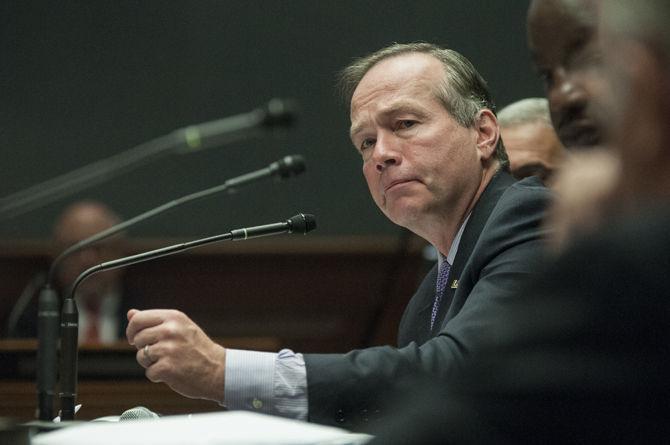Faculty reductions, decreased enrollment rates and higher tuition and fees are risks the LSU System administration will have to consider if it wants to preserve the value of the University’s bachelor’s degrees.
As Louisiana continues to face the largest budget shortfall in the history of higher education, administrators have begun to consider how the University will be internally restructured to minimize the effects of Louisiana’s over $940 million revenue shortfall.
LSU President F. King Alexander said the discussion about restructuring is ongoing and will involve troubleshooting issues of revenue generation and tax revenue reductions.
“It’s a wait-and-see at this moment,” Alexander said. “Republicans and Democrats and Independents realize the budget is a disaster … It will be an eventful semester on the legislative front.”
According to a Louisiana Board of Regents news release, published on Feb. 12, higher education’s portion of the cuts have reached $205 million for the current fiscal year, with an additional $180 million detriment anticipated for the 2016-2017 fiscal year.
Alexander said the threat of budget cuts in January 2015 cost the University some faculty applications and out-of-state students because of fear.
The 2016 mid-year cuts will have more dramatic effects on tuition and fees, as well as University provided student and state services.
The Regents news release listed faculty layoffs, incomplete grades and cancellation of both May graduation and fall 2016 athletic events as potential effects of the cuts.
“We are doing nothing but playing defense,” Alexander said. “But we have a great deal of sympathy from our legislators right now.”
Political science and business administration junior Matt Oakes said increases in student loans and having to work extra jobs to pay for class are what scare him most about the current budget situation.
“I think that decreasing the amount of funding that LSU or TOPS receives from the Louisiana government will only damage Louisiana in the long term and encourage students to seek education out of state,” he said. “I hope to see John Bel Edwards and LSU work toward a plan that will best benefit students.”
Executive Vice President and Provost Richard Koubek said budget cuts have been a threat to the University since he began working here in 2009, but they have had minimal effects on faculty and student retention. He believes there is a “buffer” built into the mid-year cuts that the University will be able to handle.
Because the mid-year cuts would occur after the start of the semester, Koubek said he does not anticipate they will have much influence on current hiring and enrollment.
“People at LSU are committed during the highs and the lows,” he said. “We have wonderful scholars, and I think the character that kept them here before will keep them here now.”
Koubek also said University administration does not intend to increase tuition unless it sees that the optimal solution.
According to Louisiana Revenue Statement 17:3139.5, institutions cannot increase tuition and fee rates by more than 10 percent annually without approval from the legislature.
The plan is to first tap into the University’s reserves and make internal cuts because the mid-year cuts are a problem of cash flow.
If the University has to increase tuition rates, Koubek said he suspects they will be minor.
Alexander said if such a hike had to occur, the University would want to “keep it in the classroom,” meaning that money could not be used to fund the state government’s prison guard hires or brokers as has been done in the past.
“There’s different solutions — some people open the floodgate and lower their GPA, and they fill the hole that way,” he said. “We’re not going to do that. That’s not our plan. The first thing we said we would do is protect the value of the students’ experience here at LSU, and then we would do everything necessary that we had to do because that’s our job.”
University administrators prepare to respond to cuts with internal restructuring
February 14, 2016
Louisiana State University President F. King Alexander sits before members of the Joint Legislative Committee on the Budget on Sunday, Feb. 14, 2016 at the Louisiana State Capitol.





